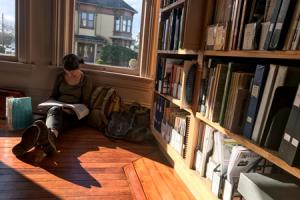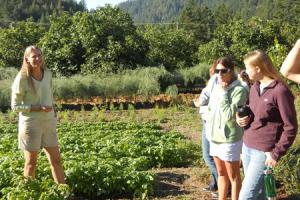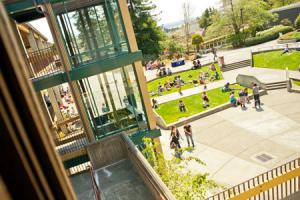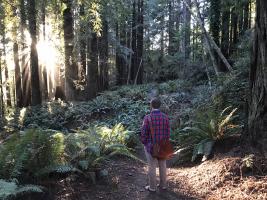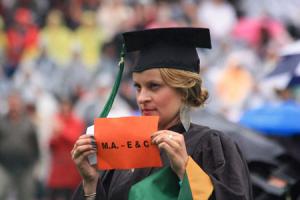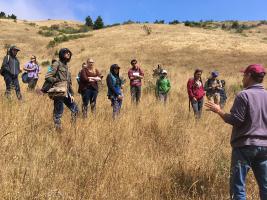Spring 2014
Unless otherwise noted, events are 5:30pm-7:00pm Thursdays in Science B 135 *
February 6
Adam Browning
“Solar Market Development in the US: Theory, Practice, and Prognostications”
Adam is the co-founder and Executive Director of the Vote Solar Initiative, a non- profit organization with the mission of bringing solar energy into the mainstream. Vote Solar got its start with a successful ballot initiative for a $100 million solar revenue bond in San Francisco in 2001, and since then has been working with state and municipal governments on pro-solar policies, with the goal of jumpstarting the national transition to renewable energy. Vote Solar has 10 advocates spread across the country, working full-time to advance solar markets.
Prior to Vote Solar, Adam spent eight years with the U. S. Environmental Protection Agency’s San Francisco office, where he won the Agency’s top pollution prevention award for developing a program that reduced air emissions of mercury. Adam received a BA with Distinction from Swarthmore College in 1992, and served with the Peace Corps in Guinea-Bissau, West Africa.
POSTPONED TO APRIL 3, 2014
Denise Burchsted
“Natural Dams and the River Dis-Continuum” watch full presentation
The billion-dollar river restoration industry relies primarily on the perception that pre-disturbance rivers were free-flowing. Despite the importance of many dam removal projects in restoring anadromous fish runs, this talk emphasizes that not every dam is a bad dam. In particular, remote rivers with limited human influence are dominated by “natural dams,” especially wood jams and beaver dams, which create patchy, discontinuous river systems. These patchy systems have much greater variation in habitat than purely free-flowing ones, which increases their resilience to disturbance and which also increases support for all life stages of critical species such as anadromous fish. This talk presents field research that describes the impacts of natural dams and then describes implications for river restoration when they are included in the pre-disturbance baseline.
Denise Burchsted studies rivers and wetlands across disciplines, with formal training in water resource engineering (BS, University of Connecticut School of Engineering), aquatic ecology (MFS, Yale School of Forestry & Environmental Studies), and fluvial geomorphology (PhD, University of Connecticut School of Liberal Arts & Sciences). As an Assistant Professor of Environmental Studies at Keene State College and as a Professional Engineer, she applies academic rigor to water resources management and design. In addition to her academic research, she has designed dam removals and other fish passage projects, designed salt marsh and freshwater wetland restoration projects, evaluated restoration alternatives in the Everglades, and led non-profit watershed conservation planning efforts.
February 24 *Monday in Native Forum BSS 162
Karen Litfin
“Ecovillages: Integrating Ecology, Economy, Community and Consciousness” watch full presentation
Karen Litfin has been on the Political Science and Environmental Studies faculty at the University of Washington since 1991. Her books include Ozone Discourses: Science and Politics in Global Environmental Cooperation (Columbia University Press, 1994) and The Greening of Sovereignty (MIT Press, 1998). In her research and teaching, she integrates cognitive, emotive, and practical dimensions of sustainability. Her newest book, based upon travels to ecovillages around the world, is Ecovillages: Lessons for Sustainable Community. This talk is part of Karen’s book tour.
March 6
Richard Norris
“Geologic Analogs to Future Global Change”
Richard Norris works on climate and evolution in the oceans on a variety of time scales. A good deal of his work is focused on the biological and physical processes that structure marine biodiversity. These studies rely on fossils and geochemical analysis of marine sediment cores and the zoogeography of modern plankton and fish. He is also interested in human impacts on the environment, and forecasting where the “tipping points” lie in marine ecosystems. Richard’s background includes a BS from UC Santa Cruz, a MS from the University of Arizona, and a Ph.D. from Harvard University. He was a postdoc and research scientist at Woods Hole Oceanographic Institution before joining Scripps Institution of Oceanography in 2002.
March 13
Matthew Marshall and Colin Sheppard
“Preparing for Plug-in Electric Vehicles on the North Coast” watch full presentation
Matthew Marshall is the Executive Director of the Redwood Coast Energy Authority. Matthew has been involved in a variety of energy and sustainable development planning, policy, and implementation endeavors. Matthew previously served as the Greenhouse Gas Reduction Program Administrator for the City and County of Denver, where he was responsible for developing and managing greenhouse gas reduction projects and community partnerships in support of Denver’s Climate Action Plan. A graduate of Cal Poly Humboldt, Matthew’s work on innovative sustainable energy systems has been recognized and honored by the National Hydrogen Association, the U.S. Department of Energy, the California Hydrogen Business Council, and the United States Congress.
Colin Sheppard is a Research Engineer and a resident quant at the Schatz Energy Research Center. Colin defines professional bliss as the intersection between his two passions, sustainable energy solutions and computer assisted analysis of systems too complicated to explore analytically. The North Coast Plug-in Electric Vehicle project has been a recent source of bliss in Colin’s life.
March 27
Yvonne Everett
“Collaborative Cross-Boundary Stewardship: International Comparisons of Challenges and Success” watch full presentation
Yvonne Everett is Professor of Environmental Planning in the Department of Environmental Science and Management at Humboldt. She earned a BA in International Relations from Pomona College and MS and PhD degrees in Wildland Resource Science with emphases in agroforestry and landscape ecology from the University of California at Berkeley. She is a board member of several community based conservation organizations including the NeoSynthesis Research Center in Sri Lanka, and the Watershed Research and Training Center and the Northcoast Regional Land Trust here in Northern California.
Yvonne’s research interests focus on institutions that support socio-ecological sustainability and resilience at the landscape scale. She has worked in collaborative agroforest, forest, watershed restoration and disaster management efforts on public and private lands. This presentation will report on her recent sabbatical research in Sri Lanka, Germany and Australia comparing factors that contribute to success in voluntary efforts of private landowners to achieve landscape scale stewardship that would not be possible without collaboration across private property boundaries.
April 10
Duncan Callaway
“Leveraging Large Data Sets and Control to Enable Low Carbon Power Systems” watch full presentation
Duncan Callaway is an Assistant Professor of Energy and Resources and Mechanical Engineering at the University of California, Berkeley and a faculty scientist at Lawrence Berkeley National Laboratory. After receiving his PhD from Cornell University he was an NSF Postdoctoral Fellow and held senior engineering positions in the energy industry. Prior to joining the University of California he was a Research Scientist at the University of Michigan, Ann Arbor. His current research interests are in the areas of (i) modeling and control of aggregated electricity loads and storage devices, (ii) spatially distributed energy resources, (iii) environmental impact assessment of energy technologies, and (iv) using information technology to improve building energy efficiency.
April 24
Chris Peters
“Native American Sovereignty: A Sustainable Paradigm” watch full presentation
Christopher Peters (Pohlik-lah/Karuk) is Owner and Principal Consultant for Red Deer Consulting, an independent firm that provides identity based cultural advising, mentoring and capacity building services for tribal communities. For the past 25 years, Chris has also served as the President and CEO of the Seventh Generation Fund for Indigenous Peoples, a 36 year-old Native American Public foundation that provides grants and technical support to Indigenous Peoples throughout Native America.
Over the past 40 years Chris has been actively engaged in social justice organizing, protecting sacred sites, working for holistic community renewal, and supporting the revitalization of cultural healing traditions and strategies. His work includes close partnerships with local, national and international honored tribal elders. He is especially focused on the renaissance of sacred knowledge and Earth Renewal ceremonies of the Yurok People. He has a BS degree from the University of California at Davis and has also earned a MA degree in Counseling Psychology from Stanford University.

